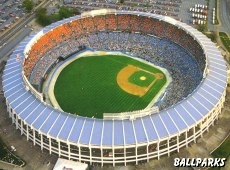Bob Short Finished What Other's Had Started
 [September 25th] -- Bob Short. Just the mention of the name darkens the skies and depresses the soul. In 1970, Short traded three of his best players to the Tigers for the enigmatic and over-the-hill Denny McLain, drastically reducing both wins in the standings and fans at the stands. Crying "poverty," Short and the team were in Arlington, Texas a year later.
[September 25th] -- Bob Short. Just the mention of the name darkens the skies and depresses the soul. In 1970, Short traded three of his best players to the Tigers for the enigmatic and over-the-hill Denny McLain, drastically reducing both wins in the standings and fans at the stands. Crying "poverty," Short and the team were in Arlington, Texas a year later.
D.C. baseball fans remember what Calvin Griffith did to the city of Washington in 1960. D.C. baseball fans remember what Bob Short did a decade later. Few remember, however, that there was another owner who tried to move the team in that period between pariah #1 and pariah #2.
The Braves were not the first baseball team courted by the city of Atlanta. A new, modern stadium, "like that one in Washington," according to the mayor, was on the drawing board since the early 1960's. The city was ready to begin construction the moment a team was found.
Days after Kansas City officials turned down owner Charlie Finley's request for a new park for the Athletics, he was invited to Atlanta to look at potential sites for the new stadium there. By July of 1962, however, it was obvious that Finley didn't have the support of his fellow owners for a move to Atlanta. The deal was dead. 1963, however, was more fruitful. The Braves, no longer the wonderchild in Milwaukee, were suffering from a combination of low attendance and political indifference. Agreements were eventually signed, a stadium built, and although slowed by a judge's ruling, the move to Atlanta was completed in time for the 1966 season. Atlanta had their baseball team. The Athletics were Atlanta's second choice, the Braves their third. The Senators had been their first.
Calvin Griffith's attempt to move the Senators to Bloomington, Minnesota was met with all the bluster that Washington politicians could muster. It was only when Major League Baseball promised an expansion franchise to the city did the lawyers finally back off. Griffith's moving vans weren't past Fairfax Circle before Elvin Quesada, the FAA administrator, was named the owner of the Senators II.
The honeymoon lasted less than a year.
Quesada was not a wealthy man, and his operating capital was depleted before the end of the first season.
Attendance dropped by 55,000 from 1960. Although playing in the new RFK Stadium would greatly increase revenue, Quesada wasn't sure he could keep the team afloat until then.
Enter Colonel Beauregard Peyton of Atlanta. Beauregard was a life long resident of Atlanta. He was a businessman who envisioned an Atlanta based baseball team as a conduit to a regional television and radio network. A team in Atlanta, he correctly assumed, would likely be embraced by fans in all the southern states. Unlike Short, Peyton didn't hide his plans. Many believed that it was just a matter of time before the team moved south. Washington legend Shirley Povich wrote, "It is not believed that the American League would allow him to move for the 1962 season, so he will have a full year to work on American League president Joe Cronin, a former Senator player."
Peyton promoted manager Mickey Vernon to general manager, and hired another former Senator, Cecil Travis, to manage the club. Povich was wary of this move, "wondering" in his column if Peyton made Vernon the GM so that he could succeed, or more likely, so he could fail.
Of course, Peyton never got his wish. American League owners didn't want to hear about losing their "anti-trust exemption" from piqued congressman still angry about the Calvin Griffith move, and refused to entertain Peyton's request to move the team. The Senators were sold again before landing in the lap of Robert Short, who completed Peyton's "dirty deed" in 1971.
In the end, all is forgiven. Washington now has a National League team, plans for a new stadium, and a fan base large enough to support a top-notch organization. Although the thirty-four year wait was painful, it helped all of us remember what its like not to have a team. This time, D.C. baseball will be forever embraced and never taken for granted.
Oh, and by the way ... rot in hell Bob Short.
Thanks for your work
<< Home





